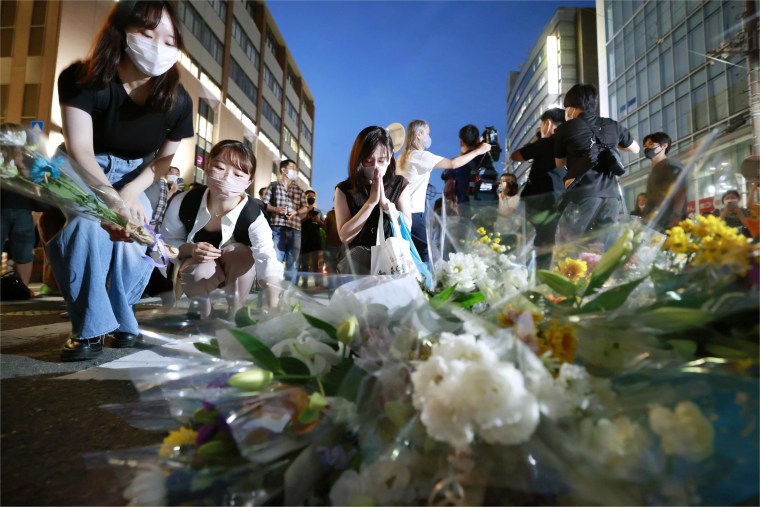TAIPEI, Taiwan — Japanese police admitted there had been problems in the security for slain former prime minister Shinzo Abe as the country reeled in the wake of his assassination at a campaign stop.
The police chief of the Nara prefecture where Abe was shot said on Saturday it was undeniable there were problems with security given that the former leader was killed by a firearm under his force's protection.
“I take this extremely seriously, and with the utmost regret," prefectural police chief Tomoaki Onizuka, who appeared teary-eyed, said in a press briefing. The shooting was entirely his responsibility as he oversaw the security plan and approved it, he added.
“In light of causing this very serious consequence, I believe that it is undeniable that there were problems related to the security for former Prime Minister Abe, and I intend to promptly identify these problems and take appropriate measures to solve them,” he said, vowing a thorough investigation.
Abe, 67, collapsed next to a road barrier after being shot twice from behind as he was campaigning for a fellow politician on Friday.
Tetsuya Yamagami, 41, who claimed to have military ties, confessed to the shooting Abe, police said in a press briefing on Friday. A man by the same name had served in Japan's Maritime Self-Defence Force from 2002 to 2005, a spokesperson told Reuters, but declined to confirm whether the man was the suspect.
The assassination of the Japanese political giant sent shock waves not only throughout Japan, where political murders and gun violence are both very rare, but across the world.

Security experts in the country called for a thorough investigation into the shooting. Fumikazu Higuchi, a former Kyoto prefectural police investigator, said Abe appeared to have had insufficient security.
“It is necessary to investigate why security allowed Yamagami to freely move and go behind Mr. Abe,” he told a Nippon TV talk show, referring to video footage that appeared to show open space behind Abe before he was shot.
On Saturday, Abe’s body returned to his home in the high-end district of Shibuya in Tokyo, according to state broadcaster NHK, making the seven-and-a-half-hour journey from Nara Medical University Hospital, where he had been pronounced dead.
According to the Associated Press, Abe’s wife, Akie Abe, was photographed in the vehicle, which met a crowd of mourners with flowers waiting outside the prime minister’s residence.
Flowers also lined the pavement and residents paid their respects on the street in the city of Nara where Abe was shot Friday.
“I am really shocked because I thought Abe would continue his efforts to make the country better," a Natsumi Niwa, 50, told the Associated Press.
“My child’s name includes the term ‘kuni,’ which represents the beautiful nation built by Abe, so I came here to offer my gratitude to Abe and wanted to tell my child about him, she added.”
An outpouring of condolences from world leaders continued to flow on Saturday, as the country mourned the loss of its longest-serving prime minister.
Even though Abe had resigned in 2020 citing health concerns, he remained influential in Japan as head of the ruling Liberal Democratic Party, heading its largest faction. But his ultra-nationalist views and unapologetic stance on Japanese World War II atrocities made him a divisive figure.
President Joe Biden called Prime Minister Fumio Kishida on Saturday morning, expressing his condolences and saying that he stands with the people of Japan.
“I am stunned, outraged, and deeply saddened by the news,” Biden said in a statement, calling the former Japanese leader a “champion of the alliance between our nations and the friendship between our people.”
Abe had pushed for a closer alliance with the United Stated. He also led President Barrack Obama's visit to Hiroshima in 2016, the first time an American president had visited the area where the U.S. dropped an atomic bomb. The bomb, one of only two to ever be used during a conflict, helped force Japan's WWII surrender.
Abe in turn also became the first Japanese Prime Minister to visit Pearl Harbor later the same year.
Abe’s passing also weighed heavily on neighboring Taiwan, which had found in the leader a strong supporter against the threat of a Chinese invasion. President Tsai Ing-wen described Abe as “Taiwan’s steadfast friend” in a message of condolences on her official Facebook on Friday evening.
Taipei City’s iconic 101 building was emblazoned on Friday evening with messages that read “Thank you Prime Minister Abe” and “Taiwan’s forever friend.”
Esteem for the longtime leader was displayed elsewhere in the region, with India's prime minister Narendra Modi declaring Saturday a national day of mourning “as a mark of our deepest respect.”
Chinese President Xi Jinping, who had a strained relationship with Abe over regional issues including tensions across the Taiwan Strait, also sent his condolences personally to Abe's family and on behalf of the Chinese people, the country's Ministry of Foreign Affairs said.
“I deeply regret his sudden death,” Chinese state media reported Xi as saying, adding that he had once reached a consensus with the Japanese leader on China-Japan relations.